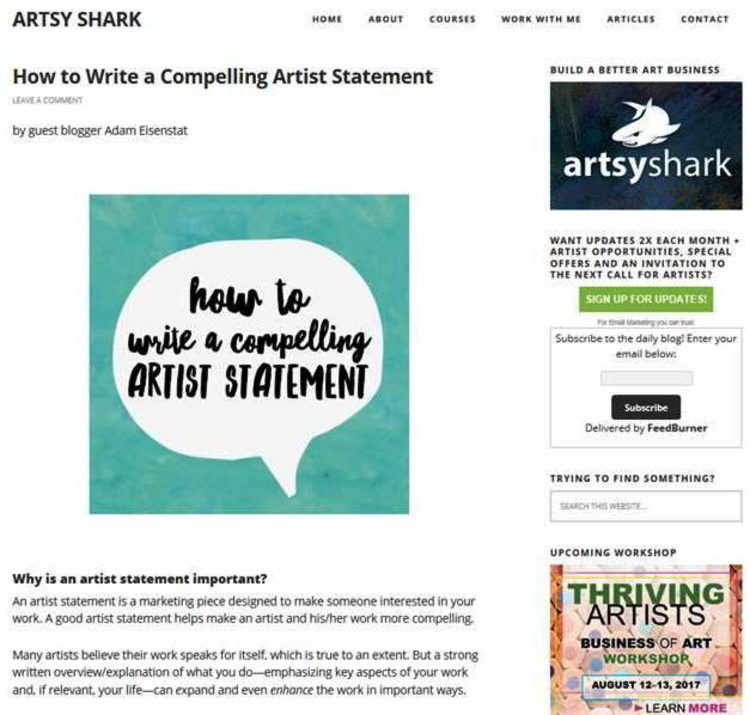
How to Write a Compelling Artist Statement [Article]
Artsy Shark - June 22, 2017
Why is an artist statement important?
An artist statement is a marketing piece designed to make someone interested in your work. A good artist statement helps make an artist and his/her work more compelling.
Many artists believe their work speaks for itself, which is true to an extent. But a strong written overview/explanation of what you do—emphasizing key aspects of your work and, if relevant, your life—can expand and even enhance the work in important ways.
I’ve written materials for many artists working in a wide variety of styles and genres. One artist statement I did illustrates particularly well how this standard promotional piece can really complement the work. The artist works in encaustics (wax paintings), and she’s a psychotherapist. Her paintings are very colorful and abstract. To look at them, you probably wouldn’t know that memory is a major theme of her art, and you certainly wouldn’t know that she’s a psychotherapist. But this information is crucial to her work, and knowing it clearly enhances the viewer’s understanding.
What makes a good artist statement?
Clarity. You should get to the point and be thorough about your art, but not exhaustive.
There’s always more you can say about your work (since you know everything about it), but saying too much can muddle your message.
Brevity. An artist statement should be concise. Rare is the statement that’s more than 500 words (one page, single-spaced). You have to assume that most people who see your statement will only read two or three paragraphs (if that), which is why the key information should be at the top. Keep in mind: an artist statement is a work of publicity, not scholarship or explication.
Focus. Initially, before even thinking about the specifics of your statement, you should ask yourself: What am I trying to accomplish as an artist; who am I trying to reach? This is the strategic dimension of the statement—it requires that you clarify your goals, and then write about your art accordingly, to serve those goals.
What information should be included in an artist statement?
Your statement should contain only that information you consider most important—to your art and to your goals. Stick to the basics.
Art theory, jargon, and complex ideas should be used sparingly. What if your art is genuinely complex and/or rooted in theory? That’s fine, but in your statement you should just hint at these ideas and complexities; provide a basic outline.
Here are some examples of information to include:
- Basic concept of the work/series
- Major themes, primary subject matter/imagery
- Process/methodology for creating your work
- Materials used (paint type, colors, dimensions, etc.).
- How your work is different from other artists using similar materials/similar approach
- Compositional philosophy/conceptual approach
- Influences/current inspirations
- Overarching message of your work, basic philosophy, etc.
What autobiographical elements should be included in the statement?
This leads to another question: What importance do autobiographical elements play in your work?
An artist statement should be light on personal information (which can be included in your resume or in a separate bio, if necessary). An exception to this would be if your biography—personal details of your life—are directly relevant to your work. In that case, you might want to include more autobiographical information than someone who does not overtly draw from his/her life as a basis for their art. Of course every artist draws on his/her life experience, but a lot of those details aren’t necessarily relevant and can be left out.
Some final words
Many artists approach self-promotion with dread—it may not be natural for them, and they would really just prefer to work on their art. The biggest artists don’t usually have to worry about the details of their marketing, but if you’re like most artists you probably don’t have that luxury, so you’ll have to do much if not all of your own promotion. It doesn’t have to be such a chore, though; it can be enriching and actually help you understand your own work better. And ultimately, the point is to get your work out there and advance your career. You can make promoting your work creative and personally rewarding.
